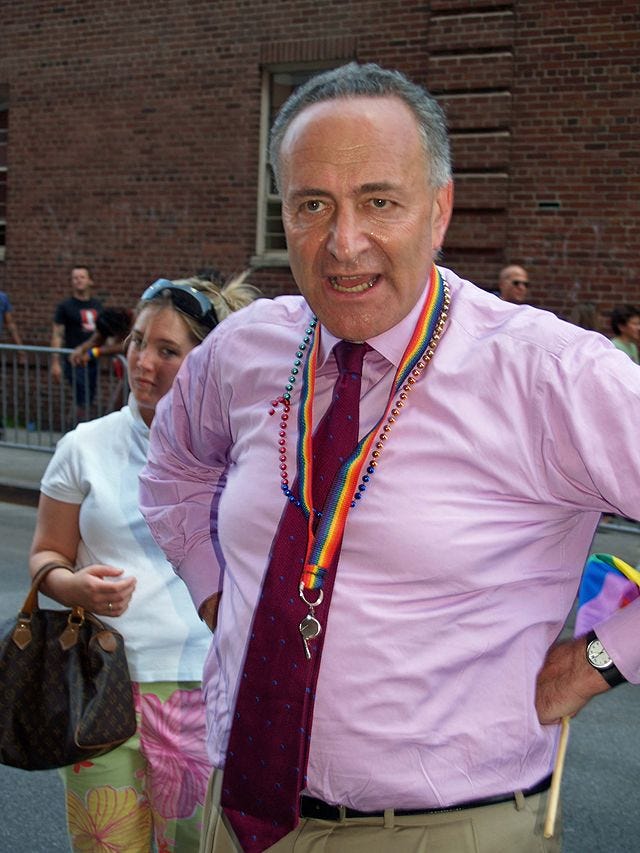Chuck Schumer Declares No Bush Supreme Court Nominee Will Be Confirmed
July 2007 speech comes more than a year before 2008 presidential election
In a prominent speech to the liberal American Constitution Society on July 27, 2007, Senator Charles Schumer of New York made clear his intention to prevent the confirmation of a Supreme Court justice if a vacancy arose during the remaining year-and-a-half of George W. Bush’s second term.
Schumer’s remarks, made more than 15 months before the 2008 presidential election, echoed the threat that Joe Biden, then chairman of the Senate Judiciary Committee, had delivered 15 years earlier to Bush’s father, George H.W. Bush, if a vacancy arose during the presidential-election year of 1992. And they foreshadowed the decision that Senate majority leader Mitch McConnell would make upon the death of Justice Antonin Scalia during the presidential-election year of 2016.
***
Chuck Schumer was the lead architect of Senate Democrats’ obstruction of George W. Bush’s judicial nominees, and he had extraordinary clout among his Democratic colleagues. So it’s no surprise that the American Constitution Society featured him as its lunchtime speaker at its national convention in 2007.
In concluding a speech that was intensely critical of Bush’s two Supreme Court appointees, Chief Justice John Roberts and Justice Samuel Alito, Schumer promised his audience that he would exert his influence to make sure that Bush did not succeed in appointing any more conservative justices to the Court:
Given the track record of this president, and the experience of obfuscation at hearings, with respect to the Supreme Court at least, I will recommend to my colleagues that we should not confirm any Bush nominee to the Supreme Court except in extraordinary circumstances.
Schumer did not spell out how Democrats would obstruct the confirmation of a Supreme Court nominee. But they had one easy means with which they were very familiar. Because they had regained control of the Senate in January 2007, Patrick Leahy was once again chairman of the Judiciary Committee. As chairman, he had full authority over whether and when to schedule confirmation hearings. As chairman in 2001 and 2002, he had simply refused to hold hearings on various appellate nominations that Democrats did not want to see confirmed, including John Roberts’s nomination to the D.C. Circuit. He would repeat that practice in 2007 and 2008.
That was exactly what Joe Biden had threatened in June 1992. If a Supreme Court vacancy were to arise while the “political season [i.e., presidential campaign] is underway,” Biden said that George H.W. Bush should not nominate anyone to the vacancy until after the presidential election. If Bush were to ignore that advice, Biden added, the Senate Judiciary Committee should “seriously consider not scheduling” a hearing until after the election.
***
Biden’s statement in June 1992 and Schumer’s statement in July 2007 both came when the president (Republican) and the Senate majority (Democratic) were of opposite parties. That is of course the configuration most likely to ignite conflict.
From the time of Biden’s statement until Scalia’s death in February 2016, every Supreme Court vacancy had arisen in a same-party configuration: the president and the Senate majority were in the same hands. So absent a filibuster (something that Democrats unsuccessfully tried against Alito), that meant that a president would get his Supreme Court nominee confirmed if he simply won the votes of the senators of his party.
In the opposite-party configuration, anyone familiar with the judicial-confirmation process would grasp that the Senate majority could try to defeat a nomination by simple inaction. Whether or not that course would succeed would be determined in the realm of political battle. Proponents of obstruction would have an easier time making their case in an election year. But supporters of confirmation could do their best to impose political costs on the obstructors.
No one argued that obstruction by inaction was constitutionally impermissible.
***
Way back in 1985, in his book God Save This Honorable Court, liberal legal icon Laurence Tribe set forth the elementary reality that “The Senate has ways of blocking Supreme Court nominations other than by straightforward rejection in a confirmation vote.” To illustrate the point, he cited an instance in which the Senate “killed” a nomination “by simply refusing to act upon it.”
But somehow Tribe, along with some 350 other law professors, would take a very different view of this simple matter when Mitch McConnell rallied his fellow Republicans to keep the Scalia vacancy open through the 2016 elections.




To have been unassailable, the McConnell principle should have been stated as
“All we are doing is following the long-standing tradition of not fulfilling a nomination in the middle of a presidential year — when the Senate and President are of different parties and the vacancy had been held by a Justice of a party different from the party of the nominee.
Since at least 1945 there has not been an election year vacancy filled by a President when the Senste is of the opposite party AND the nominee is of a different party than the Justice previously filling the vacant seat
The key point is that since at least 1945 no President other than Obama ever tried to nominate, and no President has succeeded succeeded in successfully nominating, a Justice of a party different from the Senate and whose confirmation would result in a “seat switch”.
Democrats always start it.